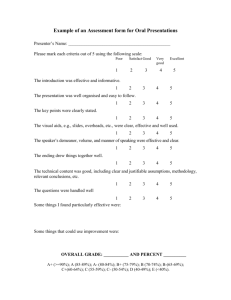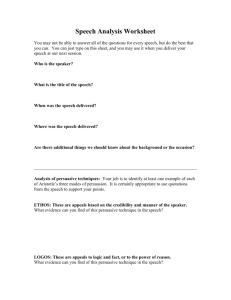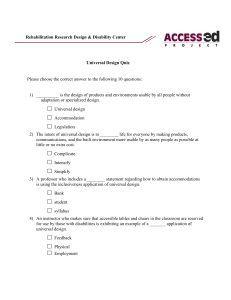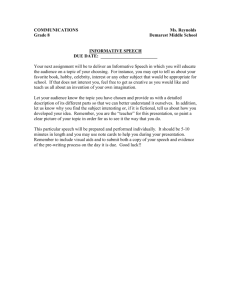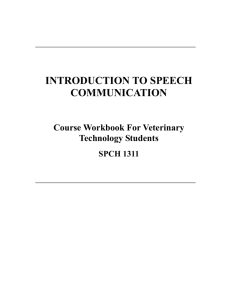S y lla bus - Highland Community College
advertisement
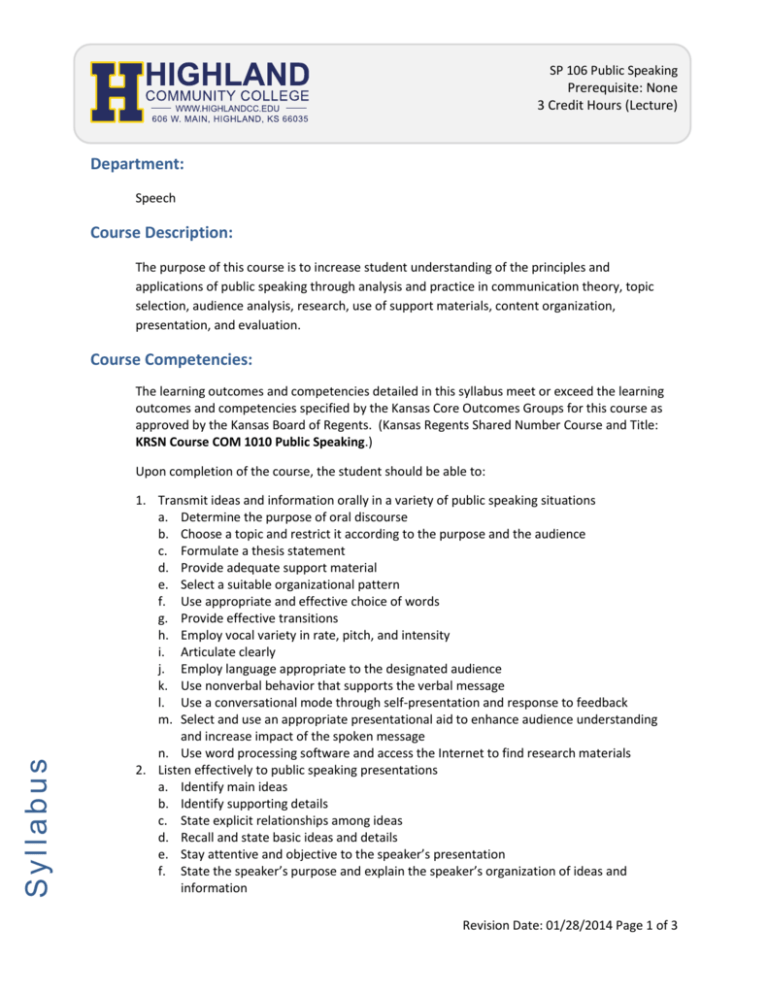
SP 106 Public Speaking Prerequisite: None 3 Credit Hours (Lecture) Department: Speech Course Description: The purpose of this course is to increase student understanding of the principles and applications of public speaking through analysis and practice in communication theory, topic selection, audience analysis, research, use of support materials, content organization, presentation, and evaluation. Course Competencies: The learning outcomes and competencies detailed in this syllabus meet or exceed the learning outcomes and competencies specified by the Kansas Core Outcomes Groups for this course as approved by the Kansas Board of Regents. (Kansas Regents Shared Number Course and Title: KRSN Course COM 1010 Public Speaking.) Syllabus Upon completion of the course, the student should be able to: 1. Transmit ideas and information orally in a variety of public speaking situations a. Determine the purpose of oral discourse b. Choose a topic and restrict it according to the purpose and the audience c. Formulate a thesis statement d. Provide adequate support material e. Select a suitable organizational pattern f. Use appropriate and effective choice of words g. Provide effective transitions h. Employ vocal variety in rate, pitch, and intensity i. Articulate clearly j. Employ language appropriate to the designated audience k. Use nonverbal behavior that supports the verbal message l. Use a conversational mode through self-presentation and response to feedback m. Select and use an appropriate presentational aid to enhance audience understanding and increase impact of the spoken message n. Use word processing software and access the Internet to find research materials 2. Listen effectively to public speaking presentations a. Identify main ideas b. Identify supporting details c. State explicit relationships among ideas d. Recall and state basic ideas and details e. Stay attentive and objective to the speaker’s presentation f. State the speaker’s purpose and explain the speaker’s organization of ideas and information Revision Date: 01/28/2014 Page 1 of 3 SP 106 Public Speaking Prerequisite: None 3 Credit Hours (Lecture) g. h. i. j. k. l. m. n. Distinguish between statements of fact and statements of opinion Distinguish between emotional and logical arguments Detect bias and prejudice Explain the speaker’s attitude Synthesize and evaluate by drawing logical inferences and conclusions Recall the implications and arguments Identify discrepancies between the speaker’s verbal and nonverbal messages Employ active listening techniques when appropriate Course Content: A. Introduction to Public Speaking 1. General course orientation 2. Listening and evaluation 3. Discussion and preparation for delivering speech presentations B. Informative Speaking and the Process of Speech Preparation 1. Determining different speech genres 2. Principles of informative speaking 3. Understanding the process speech including the outline, visual aid use, instructor, peer, and self evaluations 4. Fundamentals of topic choice, narrowing, audience and self considerations for informative speaking 5. Library research, writing outlines, and speaker’s notes 6. Preparation of thoroughly researched informative speech 7. Discussion and presentation of speech C. Persuasive Speaking and Monroe’s Motivated Sequence 1. Learning the differences between persuasive and informative speaking 2. Preliminary audience and self analysis in persuasive speaking 3. Library research 4. Preparing and conducting surveys for persuasive speech topic 5. Outlining and preparation for speech 6. Learning the basic types of informal reasoning Syllabus Learning Assessments: Course competencies will be assessed by evaluation of a minimum of four speeches that include a written component, peer review, and increasingly rigorous research. Instructional Materials: The Challenge of Effective Speaking, Verderber, Verderber, Sellnow, 15th Ed., ThomsonWadsworth Learning, 2012. ISBN10: 0-495-91134-8 Revision Date: 01/28/2014 Page 2 of 3 SP 106 Public Speaking Prerequisite: None 3 Credit Hours (Lecture) Guidelines for Requesting Accommodations Based on Documented Disability or Medical Condition It is the intention of Highland Community College to work toward full compliance with the Americans with Disabilities Act, to make instructional programs accessible to all people, and to provide reasonable accommodations according to the law. Students should understand that it is their responsibility to self-identify their need(s) for accommodation and that they must provide current, comprehensive diagnosis of a specific disability or medical condition from a qualified professional in order to receive services. Documentation must include specific recommendations for accommodation(s). Documentation should be provided in a timely manner prior to or early in the semester so that the requested accommodation can be considered and, if warranted, arranged. In order to begin the process all students must complete the “Disabilities Self-Identification Form” at this link: https://highlandcc.edu/pages/disability-services. Syllabus This form can also be accessed at the Highland Community College homepage under Students Services/Student Resources/Disability Service or by contacting the Disabilities Coordinator. Revision Date: 01/28/2014 Page 3 of 3


